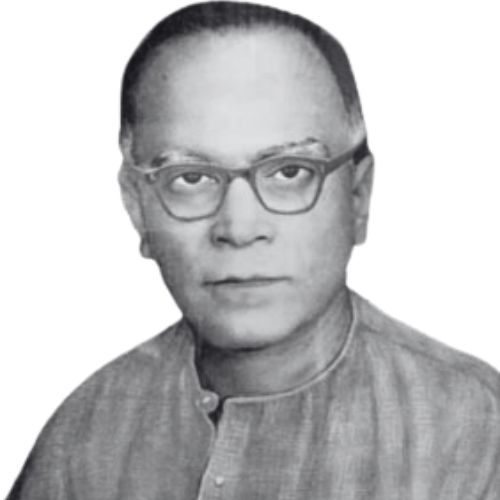Early Life
Prominent political and spiritual leader, Pramatha Ranjan Thakur was born in 1904 in Faridpur, Bengal Presidency. He completed his schooling in Calcutta. He then went on to graduate from St. Paul’s Cathedral Mission College and subsequently completed a law degree from Calcutta University. Thakur trained at the Bar in London – being the first barrister from the Namasudra community, a group of lower-caste peasants mostly based in eastern and central Bengal. He later practised at the Calcutta High Court.
Thakur travelled extensively and was particularly interested in visiting places of historical significance in France, Germany, Switzerland, Hungary and Turkey.
Thakur’s family played a pivotal role in Scheduled Caste politics in East Bengal: his great grandfather founded a religious sect – Matua Mahasangha – in the later 19th Century which was subsequently mobilised by his grandfather Guruchand Thakur in the 20th Century. Thakur’s leadership of the Matua Mahasangha influenced his political life.
Role in India’s Independence Movement
In 1930 Thakur took over as the leader of the Matua Mahasangha sect. While he continued his spiritual work towards his community, he ventured into organised politics. He established the Bengal chapter of the Depressed Classes League – a political rival to the Bengal Provincial Scheduled Castes Federations established by Jogendranath Mondal. Thakur’s organisation was affiliated with the Indian National Congress.
In 1937 and 1946, he was elected to the Bengal Legislative Assembly as an independent candidate. During his tenure as a member of the Bengal Legislative Assembly, he opposed important legislations like the Secondary Education Bill for not having adequate representation of the Depressed Classes in the management of education.
Unlike, his contemporary Mondal, Thakur did not believe that the Muslim community and Dalit community had similar interests and therefore, he opposed partition.
Contribution to Constitution Making
Thakur was elected to the Constituent Assembly in 1946 from Bengal with the support of the Congress Party. He intervened in important issues on safeguards for the Depressed Classes, justiciable rights and untouchability.
Later Contributions
Thakur continued his social, political and religious work post-independence as well. He was elected to the Bengal Legislative Assembly in 1957 and 1962. He was Minister of State, Tribal Welfare Department (1962-63). When the Indian State unleashed repressive measures on the refugee colonies that comprised the Namasudra population, he resigned from the Assembly in 1964. He distanced himself from organised politics and focused on social service.
As the spiritual leader of the Matua Mahasangha, Thakur set up Thakurnagar – a Dalit refugee colony in December 1947. His residential home was named, ‘Exile’ and served as temporary accommodation for many people belonging to the Depressed Classes who migrated to West Bengal after the Partition. Thakur encouraged the members of the Namasudra community to resettle in other parts of India as well.
He passed away in 1967.
- While supporting the Objectives Resolution, Thakur stated that the Depressed Classes are to be considered a minority and in order to protect their interests adequate safeguards must be provided in the Constitution.
- During a debate on fundamental rights, Thakur argued that economic rights are also very important, and they must also be made justiciable like fundamental rights.
- Thakur was concerned that the prohibition of untouchability would not be possible without eradication of the caste system.

